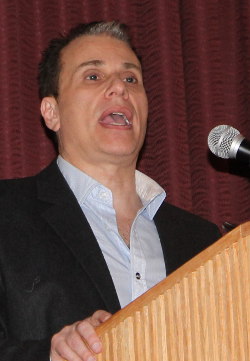
After all if there’s one thing the talkshow host can do, its talk.
And as he’ll openly tell you, he doesn’t exactly have thin skin.
“I really could care less what people think about me,” said Landsberg, shown above speaking at the Algoma Family Services Foundation, An Evening with Michael Landsberg event on Friday in Sault Ste. Marie.
“Maybe that’s one of the reasons I’m well suited to talk about depression. I don't care if people think my depression is an excuse for something or a personal weakness.”
Landsberg, host of TSN’s Off The Record, made his battle with depression public in 2009 during an interview with former NHL player Stephane Richer.
While never having any qualms speaking about his depression, Landsberg didn’t talk publically about his illness because he felt it wouldn’t make a difference.
Boy was he wrong.
Since going public about depression, Landsberg has received thousands of emails from people about depression and its effect on either themselves or loved ones.
"It's definitely a two-way street," said Landsberg. "Now, I feel less isolated and less alone."
When responding to emails Landsberg doesn’t pretend to be Dr. Landsberg - rather he provides people with a voice of experience and direction.
"That's all I have to offer. People will literally beg for help and I'll respond by saying I can't really do anything, I'm not a doctor.”
Exchanging emails with people about their experiences with depression has helped Landsberg deal with his own issues and he said messages can range from profound, to touching, to heartbreaking and tragic.
While helpful and rewarding, reading and responding to all those emails can weigh heavily on a person – especially someone afflicted with the illness people are seeking help about.
Landsberg admits he’s terrified of not responding to someone in need, in time.
"The biggest fear is getting an email from someone crying out for help and by the time I try to do something it's too late," he said.
Landsberg, who is often the first person these people talk to about depression, credits them for taking an important first step in telling someone and encourages to share with someone close to them.
The final step – seeking help from a professional – is the biggest and best thing Landsberg feels a person can do to combat depression.
15 years ago, Landsberg did exactly that after realizing something was definitely wrong.
“Depression doesn’t hit you over night. It seeps in overtime to the point where you finally realize something is wrong,” he said.
When he came to that realization Landsberg immediately sought medical help and was actually relieved when a doctor diagnosed him with depression.
Finally, he knew the cause of the sadness which could render him so helpless and depressed that he’d he unwilling to leave his couch.
“The doctor didn’t really have to tell me, I knew,” said Landsberg. “Beyond that I always tell people it was a really positive experience. I finally had a reason.”
From being so depressed that he wouldn’t want to leave his couch, to speaking publically on television about his illness is quite a jump and Landsberg credits his career for helping him make the leap.
"I'm a communicator, that's what I do,” he said. “Speaking about my feelings tends to be a lot easier for myself compared to the average person.”
Landsberg joked his career is a good fit given his depression.
Being a host of a television show gives Landsberg the chance to put on a mask on for his audience.
"The thing about me is I'm a professional liar," confessed Landsberg. "Anyone who hosts a TV doesn't convey what they're actually feeling all the time."
To cover his depression, Landsberg has learned how to act in the same cocksure manner which viewers have come to expect.
A decision Landsberg didn’t anticipate would have much impact – going public about his depression – actually turned out to be what he calls the best decision of his life; both professionally and personally.
"I don't believe in my job as a talkshow host that I do anything particularly good for society," said Landsberg. "Now, I end up sharing this crappy thing I've had and I find out I'm able to change lives."
Changing lives is not something every person can do in their lifetime - not that the talkshow show host, who has often been portrayed as arrogant but is actually quite affable, wants credit.
"I am not special. This is not 'oh look at me, I've saved lives'. Anybody who has the platform and the story to tell like I do could do what I'm doing,” Landsberg said.
On a professional note, Landsberg was inspired to do what he called the most joyous, significant and exciting thing of his career.
On February 8, 2012 Landsberg’s documentary Depression, Sports and Me aired on CTV.
Landsberg hopes it will give hope to those who need it most by showing that depression is an illness and not a weakness.
“If depression can bring down Clara Hughes, Stephane Richer and Daryl Strawberry than how can it be about personal weakness,” asked Landsberg. “Those people are anything but weak.”
Depression, Sports and Me featured interviews from Hughes, Richer, Strawberry and Landsberg; where they talk about depression and how they’ve dealt with it.
Landsberg, who penned the script for his documentary, said the message he hopes it brings to people is simple, but important – just talk about it.
"People need to talk about depression,” he said. “I hope they get that message.”